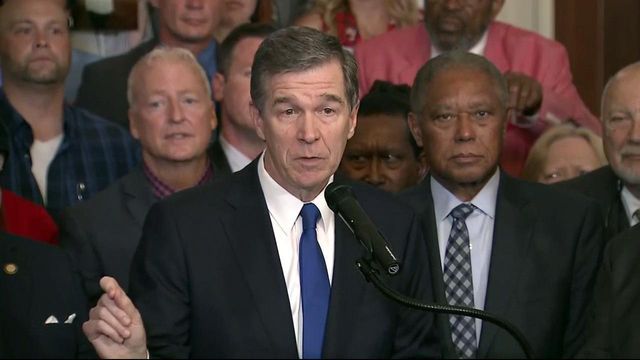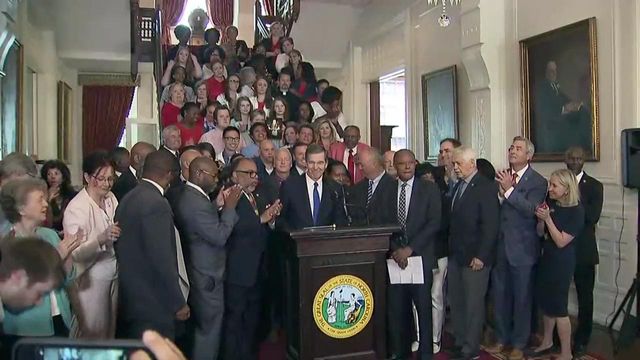Cooper vetoes state budget, calling it 'an astonishing failure'
One day after state lawmakers approved a $24 billion budget for the fiscal year that starts next week, Gov. Roy Cooper vetoed the plan Friday.
Posted — Updated"This budget, as written, doesn't move us forward," Cooper said at an Executive Mansion news conference as he was surrounded by dozens of Democratic lawmakers and others. "I want to sign a budget that will move us forward."
House Minority Leader Darren Jackson said Democratic lawmakers are united behind Cooper and will sustain his veto in a potential override attempt. Sens. Floyd McKissick, D-Durham, Ben Clark, D-Hoke, and Don Davis, D-Pitt, who all voted for the budget this week, were at the news conference.
"They've got to talk to us. We've got to work together," said Jackson, D-Wake.
The major sticking points for Cooper are that the budget doesn't expand Medicaid coverage to thousands of low-income working adults, includes a business tax cut and uses a pay-as-you-go plan to fund school construction and renovation instead of putting a major bond referendum on the 2020 ballot.
"Overall, this budget is bad. It prioritizes the wrong things," Cooper said. "It values corporate tax breaks over classrooms, gimmicks over guaranteed school construction and political ideology over people."
Cassandra Brooks, who owns day care centers in Garner and Clayton, was among those attending Cooper's announcement. She said she tried to offer health insurance to her workers, but they couldn't afford it, and they weren't eligible for Medicaid.
Brenda Pernell, one of her teachers, had high blood pressure but couldn't afford to go to a doctor, Brooks said, so she tried to manage it by drinking vinegar, a home remedy. She died in April, and Brooks said a simple prescription might have saved her.
"She didn't have access to go to a doctor. She didn't have the funding to pay for her own private health insurance," Brooks said. "I'm here for Miss Brenda Pernell and all the other child care professionals across this state. They desperately need health insurance. We need to say yes to Medicaid."
Cooper and Republican legislative leaders have been bickering over the budget in recent weeks, with each side accusing the other of not negotiating in good faith.
Senate President Pro Tem Phil Berger reiterated that stance on Friday, saying that he provided the governor with the General Assembly's positions on his priority list but still hasn't received any counter proposals.
"This is and has always been about Medicaid expansion," Berger, R-Rockingham, said during his own news conference. "The governor is blocking funds for teacher and state employee raises, the rape kit backlog, the Human Trafficking Commission and other crucial investments so he can can satisfy his far-left base and veto the budget over Medicaid expansion."
He said it's "difficult to take seriously" Cooper's announcement that he and his staff would be reviewing the budget closely over the next week to come up with recommended changes.
The budget includes teacher salary increases of about 2 percent a year over the next two years, but they are heavily weighted toward teachers with at least 15 years experience.
Most state employees would get 2.5 percent salary increases each year, with $15 million more earmarked to supplement salaries in hard-to-fill prison jobs, and state retirees would get 0.5 percent bonuses to their pensions, instead of a true cost-of-living increase, in both budget years.
The budget also has tax cuts, including rolling back the state's franchise tax on businesses and raising the standard deduction for personal income taxpayers.
Cooper disputed the suggestion that his veto was based solely on Medicaid expansion.
"I'm vetoing this budget because it fails in many ways," he said. "This budget is an astonishing failure of common sense and common decency."
Teachers deserve larger raises and more respect, he said – his proposed budget called for 9 percent raises over two years – and other school workers also should be paid more.
Cooper pushed for putting a $1.9 billion bond proposal before voters next year to help address an estimated $8 billion in school funding needs. But the budget adds money to an existing state infrastructure account, with a pledge of putting $4.4 billion to K-12 school construction needs over the next decade. Lawmakers said that funding system would save taxpayers millions of dollars in interest payments.
"Instead of a responsible bond, this budget includes a funding gimmick that is no more than a slush fund, promising projects that may never be built and taking money away from current needs," Cooper said.
As for Medicaid, he said expansion would draw down $4 billion in federal funding and create 40,000 jobs. He also suggested it could help struggling rural hospitals and become a weapon in the state's fight against opioid addiction.
Berger said such claims of expansion benefits have been oversold, and he remains convinced that putting more North Carolinians on the Medicaid rolls is "bad policy."
"It could very well blow a hole in our budget down the line," he said.
Budget process has to start over
What comes next remains to be seen. House Speaker Tim Moore hinted at an override vote in his chamber, which is taking next week off for the July 4th holiday.
"Blocking billions of dollars in funding for North Carolina communities less than a day after receiving the budget is a reckless and irresponsible decision by the governor that must be overridden to deliver critical investments in infrastructure, disaster relief, public safety, pay raises and school construction to our state’s citizens," Moore, R-Cleveland, said in a statement.
If House Democrats are able to defeat that override effort, as Jackson said they would, budget negotiations go back to square one.
Unlike the federal government, which shuts down if Congress misses a budget deadline, North Carolina state government can continue operating on the budget approved last year while a new spending plan is worked out. Lawmakers could simply walk away and leave the 2018-19 budget in place for at least another year, but Berger said he doesn't see that happening.
Cooper said he looks forward to negotiating a new budget with Berger and other legislative leaders.
"To do that, everything – Republican priorities and Democratic priorities – must be on the table," he said. "We have to find the middle ground with honest give and take."
When asked if he would sign a budget without Medicaid expansion, Cooper acknowledged some GOP lawmakers have other ideas to provide health coverage to more people.
"We just want to discuss it, and we believe it has to be a part of this budget process," he said.
Lawmakers included language in the budget for a special legislative session to discuss Medicaid and other health care-related issues, but the governor scoffed at that notion, saying, "We're in session now. ... Let's talk about it now."
The "two-track solution" of an extra session satisfies Cooper's desire that Medicaid be discussed as part of the budget process, he said.
Berger was less confident about open negotiations on a new budget, again saying he and other legislative leaders gave the governor details about the budget but never got a specific proposal in return.
"I'm not optimistic about his willingness to compromise, based on the track record that we have of his failure to offer specific responses to our compromise proposals," he said.
Related Topics
• Credits
Copyright 2025 by Capitol Broadcasting Company. All rights reserved. This material may not be published, broadcast, rewritten or redistributed.






